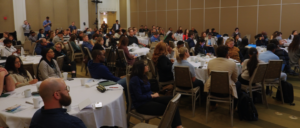Environmental assessment (EA) is a multi-faceted and multi-stakeholder process involving organizations and individuals within primary industries, consulting firms, engineering service companies, governments and the general public.
A good environmental assessment is strategic, rational, expansive, inter-disciplinary, communicative, consultative, integrative and defensible. Each stakeholder’s role is key for the evolution of a project.

Environmental Assessment Occupations
EA processes comprehend a wide range of responsibilities. Some stakeholder groups, such as EA specialists and governments, work full time on projects; others, such as project owners, scientists and non-governmental organizations specialized in environmental matters, get involved at different stages of the process.
EA leads or managers are the hub of the process in any project. They oversee the integration of stakeholders’ interests, the use of technical and scientific data and the requirements established for the assessment. Professionals that take this role typically started their careers as subject matter experts in areas related to EA. Eventually, as they gained more experience, they developed the necessary skills to carry these accountabilities:
- Conduct the environmental assessment process
- Communicate with stakeholders
- Evaluate the adequacy of the EA in achieving its objectives

Abilities and experience from other professional backgrounds are also actively involved in the environmental assessment process. Biologists, foresters, policy and strategic analysts, project managers, land use planners, to name a few, work together to provide input and guide projects.
The environmental assessment process requires consideration of the social, cultural, and community impacts. Therefore, workers from education, law, and social, community and government services are actively involved.
Environmental Assessment and the Role of Social Sciences
Social scientists in particular are gaining more relevance because of the input they can provide on the choices that individuals have made throughout history. Archeology, for example, can help researchers understand climate change. Professionals in this field of practice have long studied the impact of natural disasters.
“Archeologists recognize the importance of communicating their understandings of ancient landscapes and the threats that face particularly vulnerable populations. Archeologists work in the present to understand the past, but also to speak to future crises.” (Andrew Roddick, Associate Professor of Anthropology, McMaster University)
Environmental assessment and social sciences are more interconnected nowadays. Demand for historians anthropologists, archeologists, among others, is expected to increase, giving the EA process even more diverse perspectives.
Learn more about roles and occupations in the environmental assessment process.
Download report



